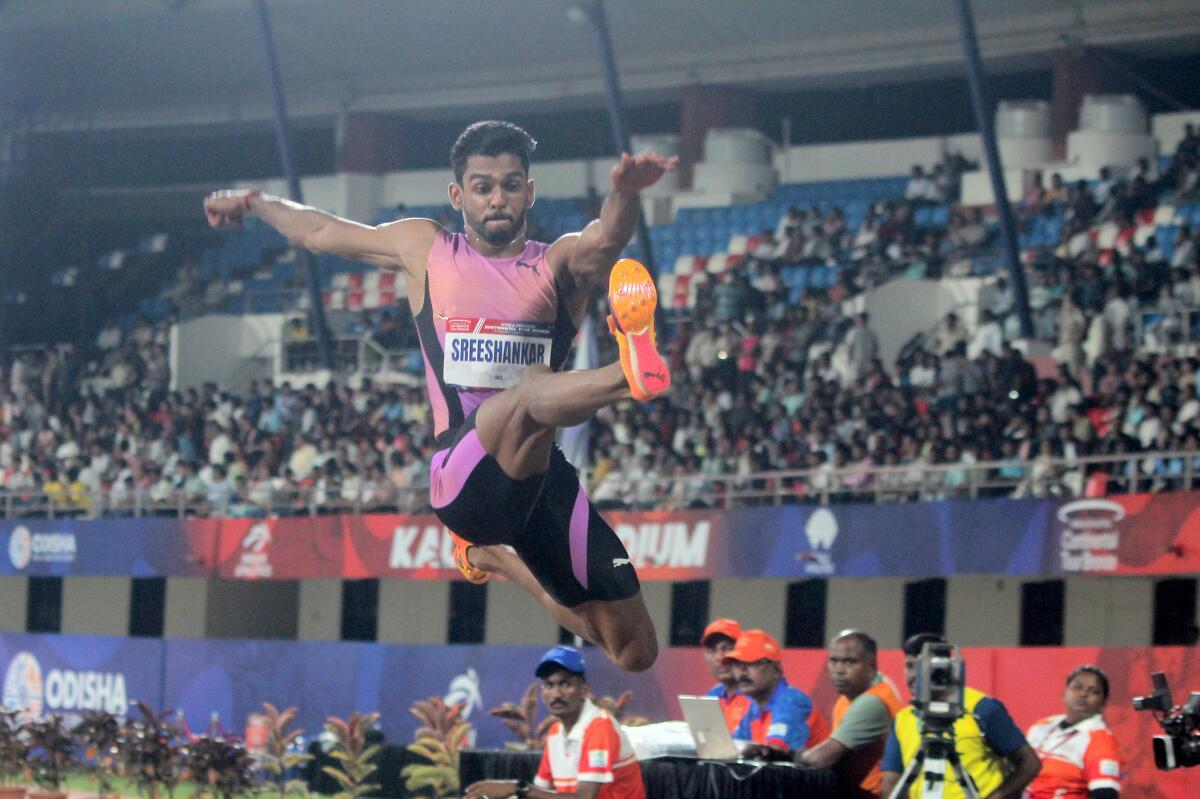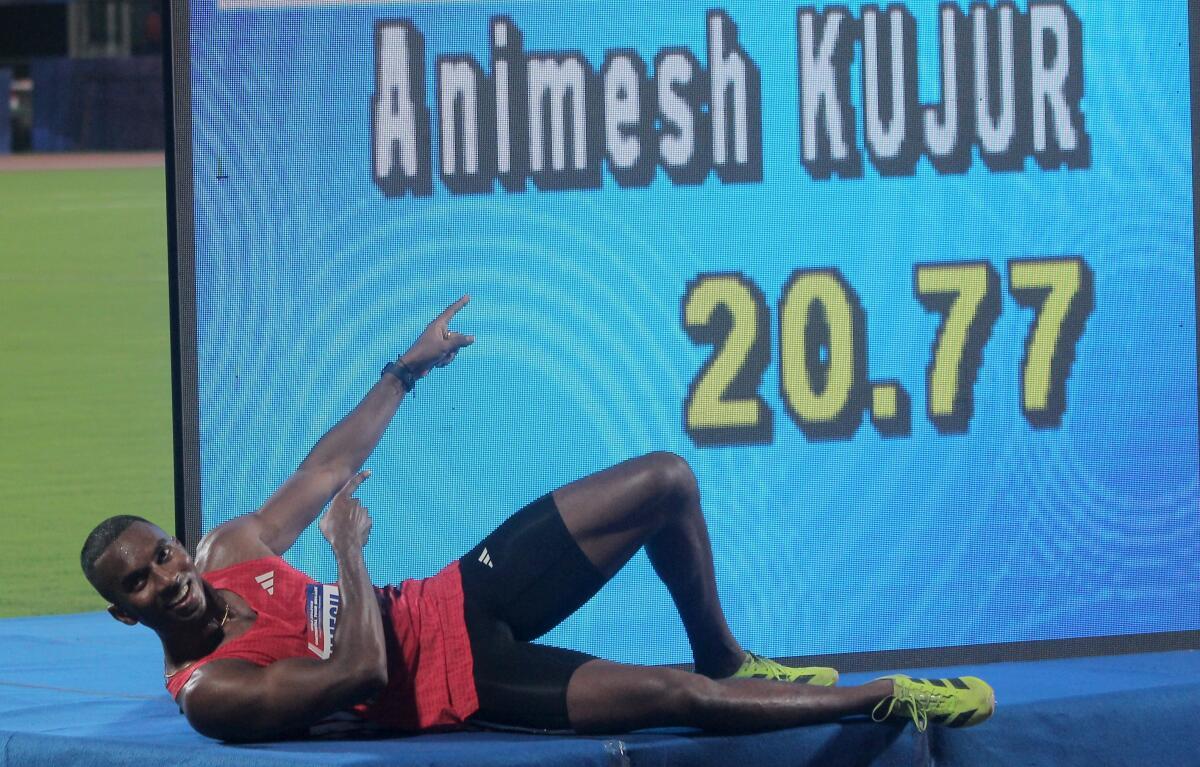World Athletics Continental Tour review: A bronze stage studded with golden performances
Performances by seasoned javelin thrower Annu Rani, ace long jumper Murali Sreeshankar and promising sprinter Animesh Kujur were among the major highlights of India’s first-ever World Athletics Continental Tour Bronze event at the Kalinga Stadium in Bhubaneswar on August 10.
With very different backstories this season, these athletes have performed consistently in events across the world.
Annu spent three weeks training in Europe, ending her stint with a season-best throw of 62.59m in Poland. Within three days, and after travelling from a different time zone and cooler climate, she defied jet lag to produce two 61m-plus throws, including her winning effort of 62.01m on her fourth attempt.
For the 32-year-old, a few 60m-plus throws after more than a year — since winning the Asian Games gold — were a welcome confidence boost. She also found encouragement in the atmosphere at the Kalinga Stadium, with spectators in the stands behind her spurring her on. She did not disappoint the young fans.
One bizarre moment came when Annu’s cheering supporters kept the warmed-up men’s 100m finalists waiting on the blocks for eight minutes. The delay was caused by concerns that the sprinters might miss the starting gun amid the noise.
Placed 30th on the Road to Tokyo rankings and set to compete in her fifth World Championships (the most by any Indian javelin thrower), Annu thanked her fans for their support and spoke of her technical focus ahead of the Worlds in Japan from September 13.
“When I throw, it’s usually at a high angle. I’ll have to keep it front-on. The other area is my run-up — I’ll have to make it fast and smooth,” said Annu, a two-time Worlds finalist.

Flight revival: On the comeback trail, Murali Sreeshankar stretched his winning run, claiming the men’s long jump title with a season-best leap of 8.13m.
| Photo Credit:
BISWARANJAN ROUT
Flight revival: On the comeback trail, Murali Sreeshankar stretched his winning run, claiming the men’s long jump title with a season-best leap of 8.13m.
| Photo Credit:
BISWARANJAN ROUT
Away from the spotlight, Sreeshankar thrived at his favourite venue — the place where he first crossed the 8m mark in 2018. In his comeback year, after missing the Paris Olympics due to a knee injury requiring surgery, the Kerala jumper has put in several impressive performances, including an 8.05m jump in Pune, both at home and abroad.
In the men’s javelin, Sri Lanka’s Rumesh Tharanga (86.50m — better than the direct Worlds qualification mark of 85.50m) and Sumedha Ranasinghe (80.65m) took first and third places respectively. Both secured automatic Worlds qualification, underlining the growing dominance of South East Asian throwers, alongside Olympic champion Arshad Nadeem and World champion Neeraj Chopra.
Among the Indians, Shivam Lokhare (80.73m) claimed second place, while Rohit Yadav, Asian Championships silver medallist Sachin Yadav (PB 85.16m in May) and Yashvir Singh finished fourth, fifth and sixth with 80.35m, 79.80m and 78.53m respectively.
The Ramaraj sisters endured disappointment. Vithya was disqualified for a false start in the 400m, while Nithya, leading comfortably in the 100m hurdles, stumbled at the eighth hurdle, fell, and fractured her leg.
Sreeshankar, who trained at the Kalinga Stadium for about a week, leapt close to 8m three times before summoning his remaining energy to better his season best with a winning effort of 8.13m. He will be aiming to improve that by another 14cm at the Inter-State Championships in Chennai to secure a Worlds berth.
Notably, national record holder Jeswin Aldrin did not start.
In the women’s long jump, Shaili Singh (6.28m) fell short of her season best of 6.64m.
Kujur, who set national records in the 100m (10.18) and 200m (20.32) this season and spent six weeks training and competing in Europe, found it difficult to acclimatise to the hot, humid home conditions after developing cold-like symptoms on his return.

Speed merchant: Kujur, the national record holder with 20.32 set at the Asian Championships in May, stormed to the 200m title in 20.77.
| Photo Credit:
BISWARANJAN ROUT
Speed merchant: Kujur, the national record holder with 20.32 set at the Asian Championships in May, stormed to the 200m title in 20.77.
| Photo Credit:
BISWARANJAN ROUT
Training at the venue, Kujur withdrew midway through the 100m heats in the morning to focus on the 200m. The Asian Championships bronze medallist clocked 20.99 in the heats before overcoming Korean Ko Seunghwan in the final, regaining the lead in the last 30m to claim victory in 20.77, cheered on by a vocal crowd.
“The European exposure was new for both me and my coach. We are learning. I wanted to perform close to my personal best, but this is okay. I’m not focusing on the Worlds — I’m looking forward to the Commonwealth Games and Asian Games next year,” said Kujur.
The Bronze event lost some sheen due to the absence of several well-known Indian athletes — including Olympic medallist Neeraj, Asian Games silver medallist Kishore Jena, national record-holding distance runner Gulveer Singh, steeplechasers Avinash Sable and Parul Chaudhary, triple jumper Praveen Chithravel, sprinters Gurindervir Singh and Manikanta Hoblidhar, and long jumper Ancy Sojan — owing to various reasons. Many withdrawals were injury or fitness related.
Even so, Indian dominance in an international field of 156 athletes from over 15 countries was a foregone conclusion. This was perhaps best illustrated in the women’s section, where the Indians completed a clean sweep.
Among other notable performances, triple jumper Abdulla Aboobacker, with a season best of 17.19m, jumped 16.53m in his third attempt to beat compatriot Karthik Unnikrishnan by 11cm.
Vishal T.K. clocked 45.72 to take the men’s 400m title, with second-placed Amoj Jacob — who had run 50.26 in the heats — recording his season best of 45.86.
By hosting the event, the Odisha Government continued its policy of promoting sport. Apart from allocating close to ₹10 crore, including prize money ($800, $400, $300 and $200 for first to fourth place respectively) and organisational costs, the government brought in schoolchildren to fill the stands and arranged folk dance performances to give the event a festive feel.
The Athletics Federation of India (AFI), which aims to raise the Bronze event’s status in future and hopes one day to host the World Championships, will need to fine-tune operational areas to ensure smoother conduct of the competition.



